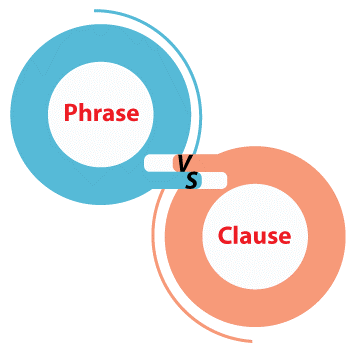Difference between Phrase and Clause
Clause
A clause is a group of words that contains the subject and verb in a sentence.
Instance:
The girl is eating.
In the above instance, girl is the subject, and eating is the verb; therefore, the complete sentence is a clause because it contains both subject and verb.
The clause can make a complete sentence that doesn't need any helping words.
For instance:
Sam laughed.
The above instance has two uncomplicated words that make a complete sentence and can be understood. It contains subject and verb, and therefore it is a clause.
A sentence can also contain more than one clause and is joined with a conjunction, which is called compound sentences.
For instance:
I like coffee but she like tea.
In the above sentence, there are two clauses- I like coffee, and she likes tea.
Phrase
A phrase is any group of two or more words that convey a concept and acting as a single unit within a sentence. The phrase is without a subject-verb unit because it does not convey any meaning, but it clarifies the context of the sentence when joined with a clause.
Instances:
On a table, on the wall, under the bed.
The above instances are of distinct sentences which do not contain subject and verb; therefore, they are categorized as phrases.
A sentence can also contain both phrases and clauses.
Instance:
She is studying under the tree.
In the above instance, she is studying is a clause that consists of subject and verb, and under the tree is a phrase that doesn't contain subject and verb.
Comparison between Phrase and Clause

|
Basis |
Phrase |
Clause |
|
Meaning |
A phrase is any group of two or more words that convey a concept and acting as a single unit within a sentence, and does not contain subject and verb. |
A clause is a grammatical arrangement that is a group of words, which contains the subject and verb in a sentence.
|
|
Component of |
The phrase is a component of a clause or sentence. |
A clause is a component of a complete sentence. |
|
Meaning |
The word in a sentence of a phrase has a meaning, but it does not form a complete sense which cannot be understood when standalone. |
The sentence of a clause gives complete meaning and can be understood when standalone. |
|
Does it Convey thoughts or ideas? |
The phrase is a part of a sentence without two parts of speech that are subject and verb, which does not convey any thought or idea. |
A clause is a part of a sentence which have two speech that is subject and verb; therefore, it makes complete sense and conveys a thought or idea. |
|
Instances |
|
|